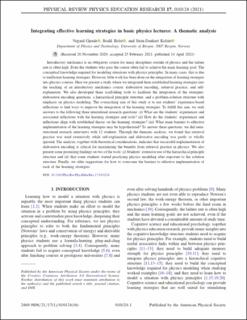Integrating effective learning strategies in basic physics lectures: A thematic analysis
Journal article, Peer reviewed
Published version

View/
Date
2021Metadata
Show full item recordCollections
Original version
Physical Review Physics Education Research. 2021, 17 (1), 010124. 10.1103/PhysRevPhysEducRes.17.010124Abstract
Introductory mechanics is an obligatory course for many disciplines outside of physics and the failure rate is often high. Even the students who pass the course often fail to achieve the main learning goal: The conceptual knowledge required for modeling situations with physics principles. In many cases, this is due to inefficient learning strategies. However, little work has been done on the integration of learning strategies into physics courses. Here we present a study where we integrated three established learning strategies into the teaching of an introductory mechanics course: elaborative encoding, retrieval practice, and self-explanation. We also developed three scaffolding tools to facilitate the integration of the strategies: elaborative encoding questions, a hierarchical principle structure, and a problem-solution structure with emphasis on physics modeling. The overarching aim of this study is to use students’ experience-based reflections to find ways to improve the integration of the learning strategies. To fulfill this aim, we seek answers to the following three interrelated research questions: (i) What are the students’ experiences and associated reflections with the learning strategies and tools? (ii) How do the students’ experiences and reflections align with established theory on the learning strategies? (iii) What main barriers to effective implementation of the learning strategies may be hypothesized? To answer these questions, we did semi-structured research interviews with 12 students. Through the thematic analysis, we found that retrieval practice was used extensively while self-explanation and elaborative encoding was partly or wholly ignored. The analysis, together with theoretical considerations, indicates that successful implementation of elaborative encoding is critical for maximizing the benefits from retrieval practice in physics. We also present some promising findings on two of the tools: (i) Students’ extensive use of the hierarchical principle structure and (ii) that some students started practicing physics modeling after exposure to the solution structure. Finally, we offer suggestions for how to overcome the barriers to effective implementation of each of the learning strategies.
